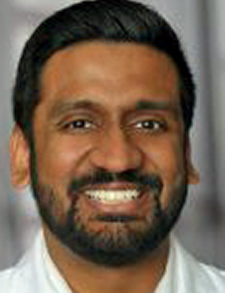
Dr. Doraiswamy
Presenter: Kenya McNeal-Trice, MD
Dr. McNeal-Trice’s plenary was a tour-de-force at the 2023 PHM Conference. She effortlessly blended basic health equity definitions and principles, important historical contexts, intimate individual patient and practitioner experiences, and actionable takeaways to deliver a powerful message.
She started by defining health equity as a principle that all individuals, regardless of factors like race, gender, socioeconomic status, or location, should have equal access, opportunities, and resources to achieve their optimal level of health, and further described it as a state where everyone has a just and fair chance to attain their highest health potential.
She defined racism as a powerful force that operates in various levels of society, both intentionally and unintentionally, and one that unfairly distributes opportunities and value based on physical appearance, resulting in advantages for some and marked disadvantages for others.
Dr. McNeal-Trice continued by introducing the crucial concept of the political determinants of health as the interconnected processes of structuring relationships, distributing resources, and wielding power, all of which simultaneously shape opportunities that can both promote health equity and exacerbate existing inequities.
These determinants encompass factors like poor environmental conditions, limited transportation, unsafe neighborhoods, and insufficient access to healthy food options. Understanding the origins and impact of these determinants is key to developing effective strategies that combat health disparities. To achieve justice in health care, hospitalists need a grasp of how politics functions and how it has influenced population health.
She shared with us the tragic historical stories and context that led to the closure of North Carolina institutions like St. Agnes Hospital and Leonard Medical School, local institutions that trained and cared for the Black residents of Raleigh. An August 2020 study in JAMA Network Open estimated that if the major institutions training Black physicians in the early 1900s had remained open, we would have had an additional 35,315 Black physicians in the U.S1.
Dr. McNeal-Trice then moved on to share heartbreaking reflections on the experiences of hospitalized children and families, including the impact of being Black when living with a chronic condition or having a hospitalized family member. She showed the impact that racial stress and trauma have on our patients and their families, further affecting our patients’ care. She described the strategies and approaches families needed to take just so they could be taken seriously in the hospital and receive the care they needed. However, even those in positions of power and importance are not immune to the challenges of racism as she shared with us the experiences of physicians who were on the receiving end of racist behaviors.
Most importantly, she concluded her plenary with actionable takeaways that allow us to make actual changes in our practices. She described how not just hospitalists, but everyone in health care can recognize disparities, educate themselves, and ultimately advocate for the change they wish to see and be.
Key Takeaways
- Hospitalists must recognize the disparities in treating patients and families in healthcare.
- It is paramount that hospitalists educate themselves to understand and acknowledge the historical context of the communities they serve.
- Hospitalists must advocate for policies and legislation promoting equitable access to health care.
Dr. Doraiswamy is an assistant professor of medicine and pediatrics, a med-peds hospitalist, and an associate program director of the med-peds residency at Ohio State University and Nationwide Children’s Hospital, Columbus, Ohio.
References
- Campbell KM, et al. Projected Estimates of African American Medical Graduates of Closed Historically Black Medical Schools. JAMA Netw Open. 2020;3(8):e2015220. doi:10.1001/jamanetworkopen.2020.15220